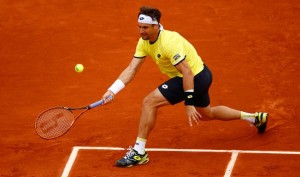by Andrew Eichenholz
Every tournament, especially at the Grand Slams the same group of names on the men’s side get thrown around as the favorites— Novak Djokovic, Rafael Nadal, Roger Federer, Andy Murray, so on and so forth.
Yet, after two rounds on the terre battue of Roland Garros, none of them are on the top of the least-troubled list. The crown in that department goes to Spaniard David Ferrer.
In beating Lukas Lacko and Daniel Gimeno-Traver in the first and second round, respectively, Ferrer lost a total of 11 games. To put things in perspective, Djokovic, who is the world No. 1, lost five games in one set alone to Jarkko Nieminen.
Yet, Ferrer, who played his second round match as the No. 7 seed on an outside court, continues to go unnoticed.
“There are no secrets to success,” Colin Powell once said. “It is the result of preparation, hard work, and learning from failure.”
Nowhere does that logic insinuate that one has to stand out. Perhaps that has been a key to Ferrer’s continued success. Since the start of 2012, he has made at least the quarterfinals of 10 Grand Slams. Roger Federer, who has won 17 major titles in his career, has only done so in nine.
There is nobody who works harder on the court, from point-to-point to number of tournaments and matches played. Of players in the top-10, a group, which Ferrer has not been outside of since 2010, the Spaniard routinely is towards the top in terms of matches played and match wins, every single year.
At the ATP World Tour Masters 1000 Mutua Madrid Open just a few weeks ago, a reporter asked if Ferrer playing many tournaments— he has competed in 11 including Roland Garros this season—affects him.
“You know, we cannot make up excuses. We’re all tired. The calendar is the same for all the players,” Ferrer said. “The more matches you play the more tired you are, but also the more happy you are. This is what we have.”
While the attention of many fans goes straight to the players who hit the “cool shots”—massive groundstroke winners, tweeners, drop shots, so on and so forth— Ferrer does one thing better than anybody else. He makes people’s lives miserable.
When a game gets to 40-0 or even 30-0, there are many competitors out there who fast forward to the next game to conserve energy. Not Ferrer. Whether he plays 200 points in a match or 80, he will put the same effort for every single one. Many call him “the little beast,” for the physical specimen that he proves he is on the court, somehow finding a way to get every single ball back on top of the offensive skills he has.
“You can write little beast if you want to,” Ferrer told Simon Cambers of The Tennis Space in 2012. “But my name is David Ferrer.”
He has no interest in the spotlight or recognition, nor will he make excuses if he should lose, as he did in the fourth round at this year’s Australian Open to Kei Nishikori.
“Kei was better than me,” Ferrer said in a press conference. “Much better today.”
He was better. That is a recurring theme in all of the Spaniard’s pressers. Even earlier in the year at the Qatar ExxonMobil Open, he found ways to claim that Tomas Berdych and Ivo Karlovic, who he beat on his way to winning the tournament, were in some way better at points.
Regardless, for a player who is used to coming out on top, winning 68 percent of matches over the course of his career, the results are not quite as crucial as he makes them seem with his work ethic and play on the court.
“ It’s one match of my career. Don’t worry,” Ferrer said in a press conference after losing to Gilles Simon at last year’s U.S. Open. “Now we have couple of weeks to rest, to stay in home. Nothing else. Enjoy with my family.”

